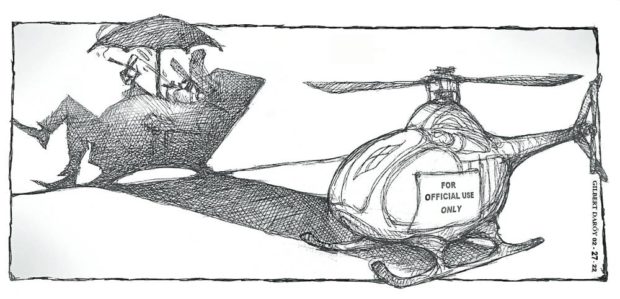
Last Monday, Feb. 21, saw the crash of a government helicopter that was on its way to pick up the police chief from an exclusive resort where he was spending private time with family. The pilot and co-pilot were injured, and a rookie policeman died.
Philippine National Police (PNP) chief Dionardo Carlos, who took over the post only last November, explained that the private transport that was supposed to bring him back to Manila on Monday morning was not available so he requested for an “admin flight” to fetch him from Balesin, a members-only recreational destination off the east coast of the Philippines.
“I regret that the accident happened and never wish harm to my personnel nor losses to the organization,” Carlos said in a statement released after the crash.
The PNP was not even forthright about it, with the statement that the downed H125 Airbus helicopter was “en route (to) Northern Quezon on an administrative mission.”
Interior Secretary and National Police Commission chair Eduardo Año said it was “right” for Carlos to use the PNP helicopter, claiming that: “Hindi mo mahihiwalay ang private time from an official time. Bilang CPNP, kasama [‘yan] sa privileges as head of org.”
There was rightful outrage on social media over an official’s use of government resources for private purpose — still fresh in the mind were scenes of ordinary workers waiting for and scrambling to get on public transport, limited in number, during the pandemic lockdowns just so they could get to work.
Under Republic Act No. 6713, or the Code of Conduct and Ethical Standards for Public Officials and Employees, public officials and employees are required to maintain professionalism, political neutrality, and simple living, among others.
The law’s Rule V on commitment to public interest specifically states that “All government resources and powers of their respective departments, offices and agencies must be employed and used efficiently, effectively, honestly and economically, particularly to avoid wastage in public funds and revenues.’’
Early this month, Civil Service Commissioner Aileen Lizada issued a reminder on the use of government vehicles, which carry red license plates, after such vehicles were seen being used in some campaign rallies. Administrative Order No. 239 signed in 2008 specifically prohibits the use of government vehicles other than official business. “If you are using government vehicles, you are using government gas and other resources,” Lizada said.
Aside from red-plate vehicles, campaign mascots for certain candidates as well as government employees, reportedly required to serve as warm bodies with some even wearing shirts identifying their department affiliation, have also been spotted at these rallies.
Certainly it was not the first time that these regulations have been flouted, with past incidents where government-issued vehicles and resources have been used for personal and family errands.
Sen. Panfilo Lacson, a former PNP chief who is running for president in the May elections, said Carlos should not be prejudged pending an investigation.
But he pointed out the need to show leadership by example. “If it was an official function, there is no problem. But if it was for personal, private situation, there is really something wrong. I was PNP chief, I never used PNP resources, choppers for my personal needs.’’
Lacson may be among the rare breed of officials who uphold the ethical standards and delicadeza but violations should not be the norm.
In other countries, social media users lamented, government officials who are caught in the middle of controversies step down — out of shame or to salvage their honor.
But in the Philippines, the morally corrupt have outnumbered public servants who embody what is stated in Section 2 of RA 6713: to “discharge their duties with utmost responsibility, integrity, competence, and loyalty, act with patriotism and justice, lead modest lives, and uphold public interest over personal interest.”
In light of the incident, the authorities should conduct a serious review of the code of conduct of government offcials and the judicious use of official properties.
That is also something that Filipino voters should bear in mind when they vote on May 9.

